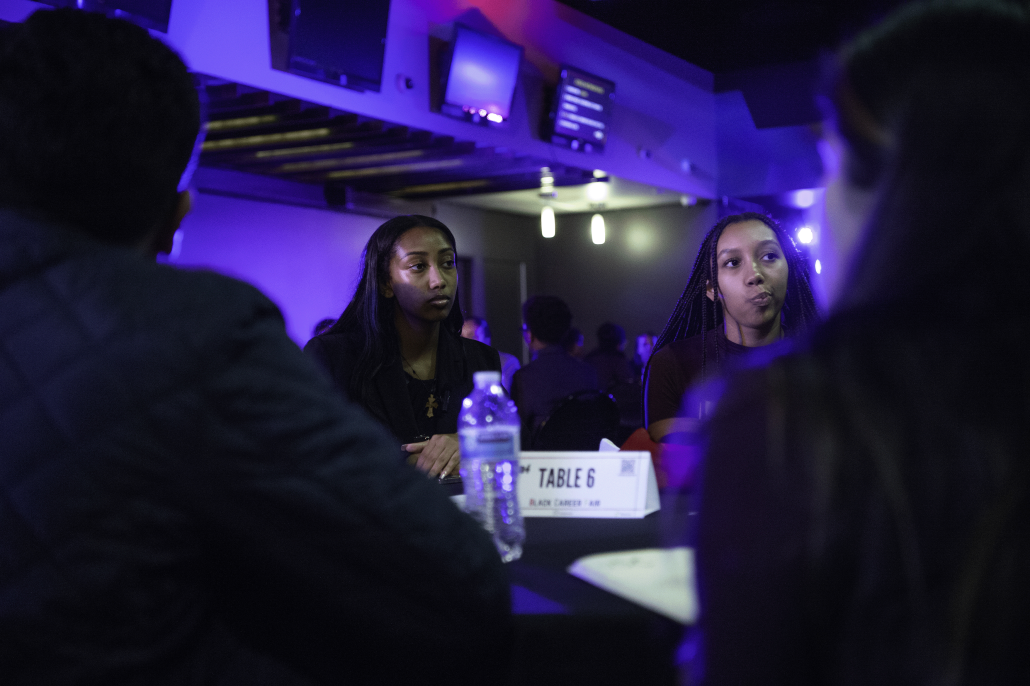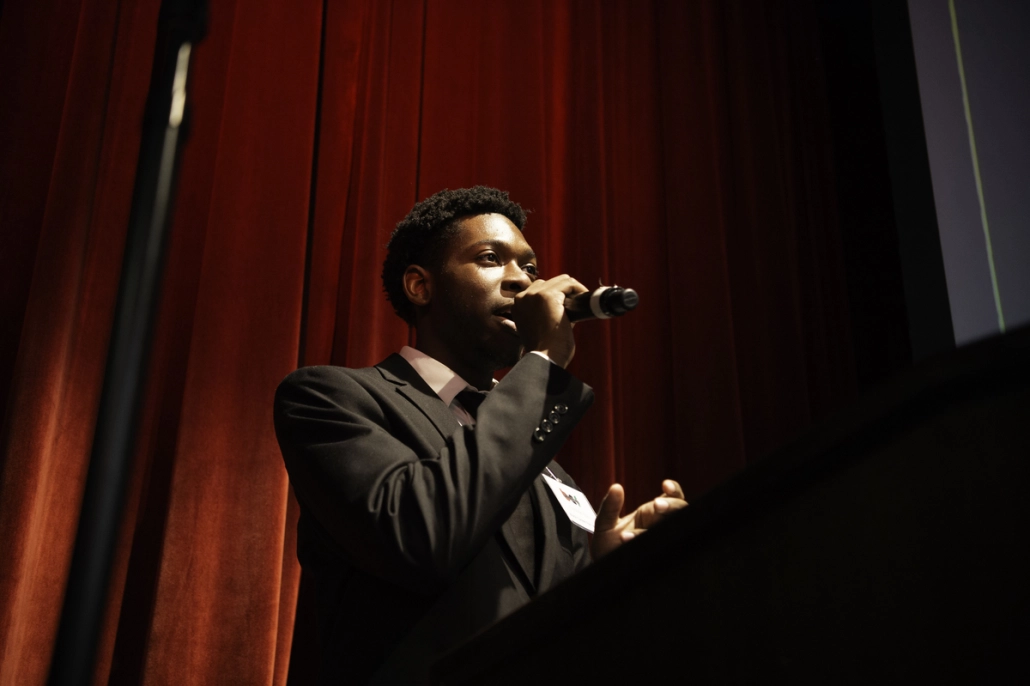Black Career Fair grows in second year
The second fair offered more companies as well as added speed networking sessions.
The second fair offered more companies as well as added speed networking sessions.

The Black Student Assembly hosted USC’s second annual Black Career Fair in Tutor Campus Center on Thursday night, taking up TCC’s Grand Ballroom and Tommy’s Place.
This year, organizers ushered in several new changes, including a new official logo and new partnerships to support the fair. They also established the Black Career Fair Committee to plan the fair and ensure that it gets all the time, effort and energy it needs.
Candace House, co-chair of the Black Career Fair Committee and a senior majoring in the business of cinematic arts, said they received feedback that the previous year’s fair had a heavy emphasis on the entertainment industry. In response, the committee sought representation for a more diverse range of industries from law and healthcare to architecture and insurance.
One major change to this year’s fair was that the speed networking occurred simultaneously with the regular tabling. In contrast to the traditional setup, speed networking is when recruiters sit down at a big table with several students for more “intimate” conversations, allowing students to get to know their potential employers on a deeper level. House said that the roundtable discussions allow for better conversations and reduce students’ nervousness.
“We wanted to differentiate ourselves from traditional career fairs,” House said. “The recruiters get to sit down with students and [students] get to actually ask, ‘OK, what was your first job like? Why did you leave it? Do you like it? What was it like being Black there? How did people receive you?’”
Some recruiters said attending the fair allowed them to reach out to the diverse talent that their companies are looking for. Adaeze Cadet, a design principal at HOK — an architecture and engineering firm — said this year’s career fair is one of the “best ones” she’s gone to.
“I think it’s important to have a focus on Black students within USC to provide a sense of community. [The fair allows] various firms to kind of target the diversity that everybody keeps talking about,” Cadet said. “If I were a student coming here, I’d feel like the firms that are signing up for this would have a place for me, so I’d be closer to getting to that universal sense of belonging.”
Andre Wilkes, a graduate student studying social entrepreneurship and a culture and business operations associate for the NFL, said many “professional” jobs in his industry are inaccessible for Black people, but not impossible for them to obtain.
“We recognize it’s challenging for Black people in the larger [sports] industry,” Wilkes said. “The relationship between the NFL and USC, I think, is a cherished relationship that we always have to pour into, but on the other side, as Black employees, because we recognize [what] this culture means to the NFL, we want to pay it back however we can.”

Several of the committee members said it was a challenge to get the career fair off the ground last year. Ire Omitowoju — the fair committee’s founder and co-chair and a senior majoring in arts, technology and the business of innovation — said this year is about ensuring the legacy of the fair continues. The committee collaborated with multiple campus organizations, including the Career Center, the Black Alumni Association and the Black Business Student Association. Instead of working within the BSA, the committee decided to recruit outside of the BSA — with a particular emphasis on underclassmen.
“[It] was daunting because this is a first-time event and, you know, there are a lot of people who are putting a lot of resources and time into us,” Omitowoju said. “We really, really wanted to make this happen and prove to everyone that we could actually do it.”
To ensure that the fair doesn’t stop, the committee decided to recruit Ayomide Ajayi, a sophomore majoring in industrial and systems engineering, as its intern. Ajayi said that last year, he started familiarizing himself with the role and the responsibilities of putting on the fair, from interacting with corporate relations to gaining business acumen. Now, he said he’s learning about acquiring vendors, coordinating finances and working with sponsors.
“I’ve been fortunate enough to be on a board with some really intelligent people that are very efficient and get things done,” Ajayi said. “I see that we continue growing, getting more companies to come and support and recruit from the best Black and brown students at the University of Southern California.”
Marielle Caldwell, a junior majoring in communication, said that she was “thankful” for the opportunity.
“[The fair] is important because one, we get to all come together as a community and be here, and it also gives us an opportunity to see each other succeed,” Cladwell said. “[At] my last community college, there weren’t too many career fairs like this. So I feel like this has been a big change.”
We are the only independent newspaper here at USC, run at every level by students. That means we aren’t tied down by any other interests but those of readers like you: the students, faculty, staff and South Central residents that together make up the USC community.
Independence is a double-edged sword: We have a unique lens into the University’s actions and policies, and can hold powerful figures accountable when others cannot. But that also means our budget is severely limited. We’re already spread thin as we compensate the writers, photographers, artists, designers and editors whose incredible work you see in our daily paper; as we work to revamp and expand our digital presence, we now have additional staff making podcasts, videos, webpages, our first ever magazine and social media content, who are at risk of being unable to receive the support they deserve.
We are therefore indebted to readers like you, who, by supporting us, help keep our paper daily (we are the only remaining college paper on the West Coast that prints every single weekday), independent, free and widely accessible.
Please consider supporting us. Even $1 goes a long way in supporting our work; if you are able, you can also support us with monthly, or even annual, donations. Thank you.
This site uses cookies. By continuing to browse the site, you are agreeing to our use of cookies.
Accept settingsDo Not AcceptWe may request cookies to be set on your device. We use cookies to let us know when you visit our websites, how you interact with us, to enrich your user experience, and to customize your relationship with our website.
Click on the different category headings to find out more. You can also change some of your preferences. Note that blocking some types of cookies may impact your experience on our websites and the services we are able to offer.
These cookies are strictly necessary to provide you with services available through our website and to use some of its features.
Because these cookies are strictly necessary to deliver the website, refusing them will have impact how our site functions. You always can block or delete cookies by changing your browser settings and force blocking all cookies on this website. But this will always prompt you to accept/refuse cookies when revisiting our site.
We fully respect if you want to refuse cookies but to avoid asking you again and again kindly allow us to store a cookie for that. You are free to opt out any time or opt in for other cookies to get a better experience. If you refuse cookies we will remove all set cookies in our domain.
We provide you with a list of stored cookies on your computer in our domain so you can check what we stored. Due to security reasons we are not able to show or modify cookies from other domains. You can check these in your browser security settings.
These cookies collect information that is used either in aggregate form to help us understand how our website is being used or how effective our marketing campaigns are, or to help us customize our website and application for you in order to enhance your experience.
If you do not want that we track your visit to our site you can disable tracking in your browser here:
We also use different external services like Google Webfonts, Google Maps, and external Video providers. Since these providers may collect personal data like your IP address we allow you to block them here. Please be aware that this might heavily reduce the functionality and appearance of our site. Changes will take effect once you reload the page.
Google Webfont Settings:
Google Map Settings:
Google reCaptcha Settings:
Vimeo and Youtube video embeds:
The following cookies are also needed - You can choose if you want to allow them:
